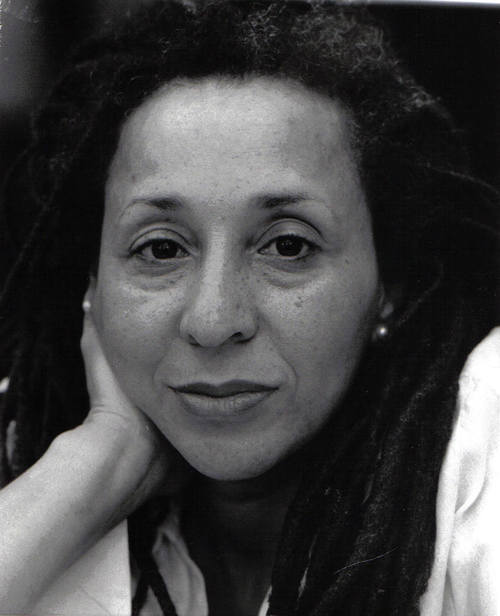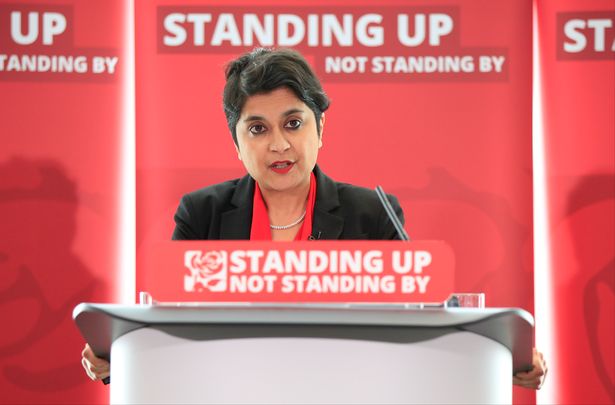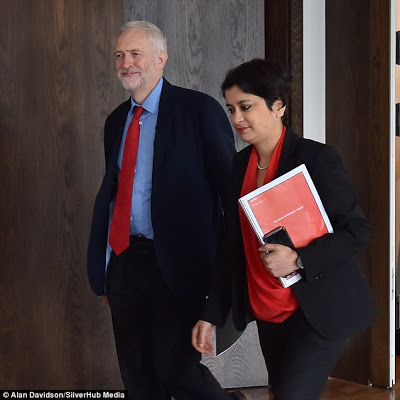A major report was issued about endemic racism in a major British institution; few people are aware of that although the report was widely reported.
Shami Chakrabarti was commissioned by the Labour Party to investigate “antisemitism and other forms of racism” in the party. Chakrabarti and her vice-chairs took their remit seriously; Zionist organisations and the British media did not.
The report raises critical issues about the treatment of members of BAME communities inside and by the party. These were obliterated by a media stampede to make the report a sideshow in the get Jeremy funfair and by a disbelief from the Zionist hierarchy that Jewish concerns were not placed centre stage.
The presentation of the findings was hidden under two confections.
Firstly, a malicious allegation that Corbyn had equated Israel and ISIS. It was clear to anyone hearing him talk or reading his words later that he had done no such thing. He equated those who make false and racist allegations about Jews to those who make false and racist allegations about Muslims. He said: “Our Jewish friends are no more responsible for the actions of Israel or the Netanyahu government than our Muslim friends are for those of various self-styled Islamic states or organisations.” It is vexatious to wilfully misinterpret that to Israel equals ISIS and only makes sense as part of a campaign to demonise and undermine Corbyn’s leadership of the Labour Party.
Secondly an accusation that Ruth Smeeth had been subject to anti-Semitic harassment. It may only be a coincidence that she made her allegation against one of the few Black men in the room. Journalists asked a series of questions about anything but the content of the report; mainly irrelevantly about Corbyn’s future or about the disciplining of Livingstone which was ultra vires for fear of contaminating the complaints procedure underway.
One question was from a Daily Telegraph journalist about a Momentum leaflet on deselection of Labour MPs. The leaflet had been handed out by Marc Wadsworth, a Black activist and journalist. He had refused to hand a leaflet to Ruth Smeeth who had been pointed out to him as one of the first MPs to call for Corbyn’s resignation – he had never come across her of heard of her before. Wadsworth had seen the Telegraph journalist, Kate McCann, hand her copy of the leaflet to Smeeth and the two sat together. Wadsworth accused Smeeth of collaboration with the media. Smeeth, whose Jewish heritage was totally unknown to Wadsworth chose to interpret the accusation as an antisemitic slur and departed the room. Later she claimed, despite video evidence to the contrary, to have fled the room in tears. This farrago became a major news story and was turned into an attack on Corbyn for failing to intervene in an event that had never happened. Ever since, it seems no media comment on the report fails to undermine it by referring to at least one these two imaginary events. Once an association has been promulgated it attracts a life of its own – fiction becomes historical fact.
The Board of Deputies, the Jewish Labour Movement, the Community Security Trust, the Jewish Chronicle all gave major prominence to these two inventions even while giving guarded welcome to the report. The accusations were picked up by Jewish and Zionist bloggers and tweeters and broadcast globally; the content of the report and its welcome were not.
We do not assert that the Jewish and Zionist media and organisations deliberately set out to occlude the report’s findings on the racist treatment of BAME communities and its recommendations on curtailing and hopefully ending such behaviour. Such assertion is unnecessary to see an unconscious, but pervasive, disregard for the suffering of any other community than the Jewish one. An anti-racist response would be to celebrate that an investigation prompted by allegations of antisemitism, and a report wholeheartedly condemnatory of the occasional antisemitic behaviour it uncovered, was also led to reveal other and more widespread racist behaviour. Acknowledging the treatment experienced by other communities does not diminish the unacceptability of the racist treatment of Jews. There is however an unpleasant current in the Jewish community that sees the treatment of Jews as special and distinct from that suffered by others.
Chakrabarti was at pains to emphasise the distinctive nature of the Holocaust that should prevent it being used as an analogy for other historical or current events even other genocides. Each act of gross inhumanity has its own nature and needs its own consideration. It is necessary to understand the particular nature of each abuse, whether the Shoah, the Rwandan genocide, the Armenian genocide or the Atlantic slave trade – it diminishes each of them by lumping them together.
We expect people of all communities to oppose antisemitism; we equally expect members of all communities, and a fortiori their organised leadership, to oppose all forms of racism and discrimination and to use their experience to empathise with others not to compete in an abasing misery stakes.
Since the referendum street racist abuse, and violence, have escalated putting all minority communities at risk. Public racism has been become normalised in a way that we had hoped we had excised over the last four decades. So far, it seems, the abuse and assaults on Jews have not been the major problem. It is rampant Islamophobia and intolerance of anyone not speaking English that have been most prevalent.
We look to the Labour Party to defend members of all communities, it can only do that if it takes up Chakrabarti’s challenge to look at itself and embark on the long and painful process to reform itself. The report correctly commends the Party for promoting legislation over the last half-century to outlaw racism and other forms of discrimination, the Conservatives have no such record. As we all know the public actions are easier than the personal ones that challenge our own feelings and beliefs. It is much harder when petty and noisy squabbling drowns out the quiet voices of pain for short-term and factional gain.
Mike Cushman




 On 29th April, as the media hyped ‘anti-Semitism’ hysteria in the Labour Party was in full swing, with daily revelations from those doughty fighters against racism at the Daily Mail, Jeremy Corbyn set up an inquiry into racism in the Labour Party under the former Chair of Liberty, Shami Chakrabarti. Chakrabarti is no radical and when it was announced that Baroness Royall of Labour Friends of Israel was to become a Vice Chair of the Inquiry I
On 29th April, as the media hyped ‘anti-Semitism’ hysteria in the Labour Party was in full swing, with daily revelations from those doughty fighters against racism at the Daily Mail, Jeremy Corbyn set up an inquiry into racism in the Labour Party under the former Chair of Liberty, Shami Chakrabarti. Chakrabarti is no radical and when it was announced that Baroness Royall of Labour Friends of Israel was to become a Vice Chair of the Inquiry I 
